Hurricane Diane
Madeleine George
Aurora Theatre Company
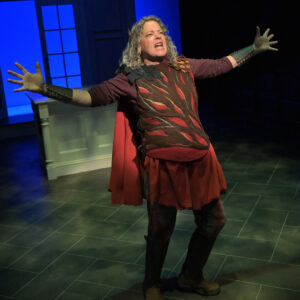
Climate, comedy, and catastrophe are the unlikely combination in Madeleine George’s Hurricane Diane, now in its Bay Area premiere at Aurora Theatre Company. The laugh-out-loud, in-your-face warnings about our potentially disastrous future features in its stormy center a lesbian, permaculture gardener who just also happens to be the Greek god of agriculture, wine, and song and who has returned to mingle among the mortals in order to heal the planet. All she needs is to find four devotees for the magical transformation back to lush, primordial forests to begin; and what better place to look than on a cul-de-sac of Red Bank, New Jersey, home to four suburban wives who appear to Dionysus, now Diane, to be prime candidates. Just as a Category Four hurricane is rushing towards the Jersey shores, a hurricane of a different sort named Diane is also about to blow with fury into the lives of four women looking to re-do their landscaping. The result is one helluva good time for us as audience – one titillating, tumultuous time for suburban New Jersey.
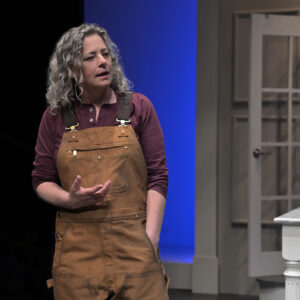
What better persona to embody the bold, butch, gardening god than the Bay Area’s perennial-favorite, Stacy Ross. With flashing lights and Richard Strauss’ 2001 theme booming, her Diane appears in heavenly robes of ancient Greece’s Olympus, declaring, “It’s time for a comeback.” The half-god/half-human realizes it is 11:45 p.m. on the cosmic clock as the earth is about to plunge into climate warming hell. Ready to roll, she strips to brown overalls and boots and heads to her first, potential accolade. Since “I’m only a demi-god,” Diane needs to find followers for her powers of change to work.
The first of four neighbors she visits to discuss re-landscaping possibilities is chirpy, talky Carol who meets her wearing pearls and buttoned-up blazer and ready to show the gardener the hundreds of clippings she has filed from her favorite HGTV Magazine. Rebecca Schweitzer is a hoot as Carol, a woman wound up as tightly as the hair bunched up on top of her head. Her horticulture goal is “high curb appeal” so nothing is done to lower the value of her home. Her dream is a wrought-iron, accent bench, which she breathlessly shows to a quite solemn, clearly disbelieving Diane.
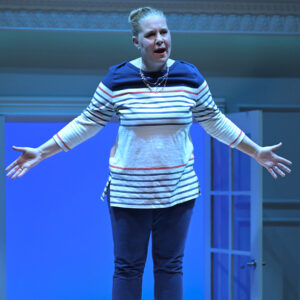
The word ‘curb’ awakens Diane into a counterattack as she explains how curbs worldwide have cut “a deep gash in the earth’s single body.” As she describes her vision for Carol’s yard where native plants like wild-looking pawpaws will replace her pristine lawn, the stage is set for a war to the end between two environmental visions and two women who each will prove to be quite the storm – one for change and one for keeping things the way they are. Rebecca Schweitzer’s Carol is scarily brilliant as the yin to Stacy Ross’s yang; which is a god and which is a devil is according to which side of the current arguments about global warming one takes.
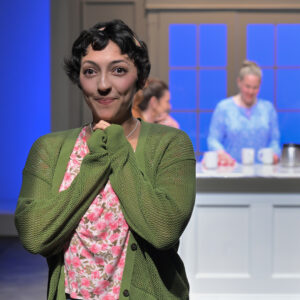
As Diane next approaches Carol’s neighbors and members of her cul-de-sac coffee-klatch, the god-on-earth finds her seductions (quite literally) a bit easier. Gianna Digregorio Rivera is Beth, a young, recent divorcée looking to create a fairy garden where she can “lie among the moss.” Beth is already quite nymph like, with wide-eyed looks a bit wild and searching for something not yet experienced. For a lesbian naturalist like Diane, Beth literally makes her mouth water.
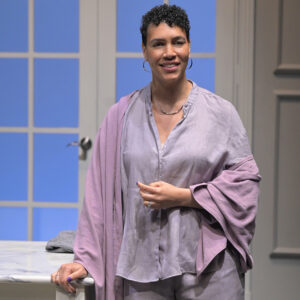
Dressed in designer cashmere, Renee – the editor of Carol’s beloved HGTV Magazine and also another neighbor – seems at first glance an unlikely target for Diane’s evolving plot. As a female, black journalist, Renee has fought for her executive status long and hard and through many splashy layouts of the perfect deck, raised flower box, or patio furniture for the popular magazine. And yet, Leontyne Mbele-Mbong’s sophisticated, rather reserved Renee is at heart a permaculture adherent who wants a yard where she can harvest “food, fuel, and medicine” – none of which currently fits into her job. Behind that societal, editorial façade, she also shows a strange sparkle when she looks directly at Diane.
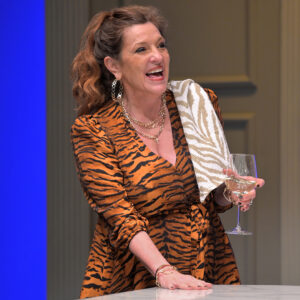
Rounding out Diane’s quartet of recruits is perhaps the most unlikely of them all, Pam, a “Joisey-ite” who – as so deliciously portrayed by Luisa Sermol – could have just walked off the set of “The Sopranos” or “Housewives of New Jersey.” Wearing strands of gold chains to match her large-looped earrings and to blend with her gold-and-black, leopard dress (just a glimpse of Brooke Jennings’ knock-em-dead costume designs), Pam is often larger than life in voice volume and expressive movements. With a police-scanner implanted in her wet bar and a panic-button ready to be pressed at her kitchen counter, she is storm-prepared. But for all her brouhaha, she wants Diane to create “my own little Italian garden,” one matching a painting at her favorite, Italian eatery, Delfino’s. Since she believes Diane’s vision of “a yard full of brambles” could become lethal projectiles during the upcoming storm, Pam is not going to be an easy win for Diane; but Diane’s desirous eyes are now quite locked on the one she seems most to desire to be a part of her minion.
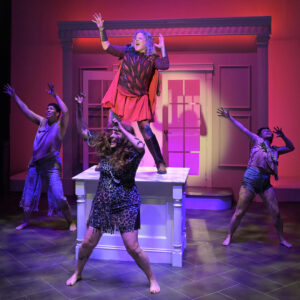
Jennifer King directs with both ferocity of purpose and a more-than-occasional tongue-in-cheek this outstanding ensemble of five. As the outside storm approaches (so realistically created by the impressive lighting and sound designs of Kurt Landisman and Lana Palmer, respectively), the director builds up the momentum inside the various kitchens into eruptions that are about to occur and that will make Mother Nature look a bit tame in comparison. When Stacy Ross’ Diane finally becomes her warrior self, look out New Jersey! The party of the converted collides with a storming war against complacency to produce a scene that is a mixture of Mardi Gras, orgy, and WWWIII.
For all the fun and the underlying serious message of Madeleine George’s Hurricane Diane, there are times when the sexual energy of the script and production seems to cloud the more important intent of the play. The implication that the mess the men of the world have created might best be resolved if put in the hands of more feminine powers is well-taken and probably well-founded. But the sexual freedom and revolution aspect of Diane’s plan muddies a bit for me what the playwright is wanting us to contemplate on how the looming catastrophe of our planet might in fact be halted.
In any case, there is much both to enjoy and to contemplate in Aurora Theatre Company’s uproarious, hilarious Hurricane Diane – especially with Stacy Ross bringing her Olympian prowess to these four, superbly personified wives of New Jersey.
Rating: 4 E
Hurricane Diane continues through July 16, 2023, in Bay Area premiere production by Aurora Theatre Company, 2081 Addison Street, Berkeley, CA. Tickets are available online at https://www.auroratheatre.org
Please note: All patrons must wear tightly-fitting masks inside the theatre.
Photo Credits: Kevin Berne
